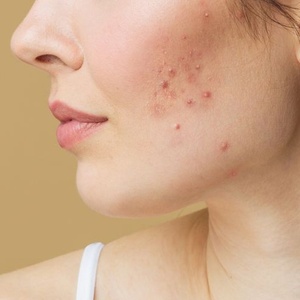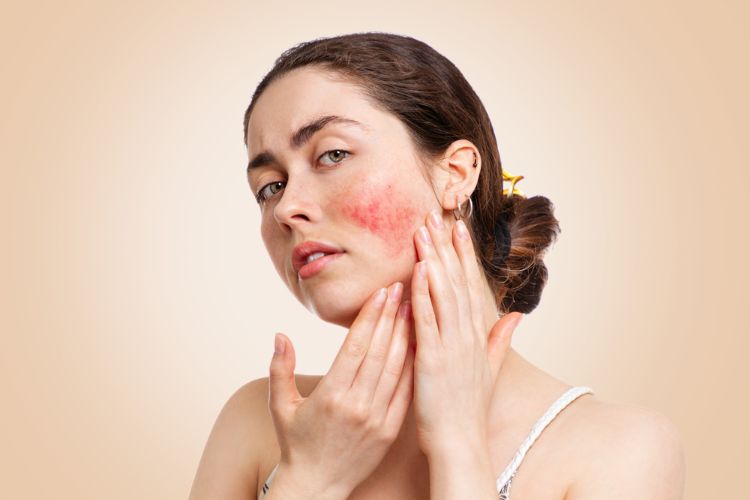Blog
Welcome to FaceForward
Get the scoop on all things beauty, wellness, and skincare.

Treating acne is already a difficult and frustrating process without throwing adverse reactions into the mix.
Sometimes, the side effects of acne treatments can be unpleasant to deal with too, especially if they cause pain, discomfort, or even a burning sensation. And, it’s important to handle negative acne medication reactions before they cause further damage.
We’ve compiled this article to help you understand the many treatment options for acne, why they can sometimes cause adverse effects, and what you can do to avoid or stop adverse reactions.
|
Summary
|
Acne is an inflammatory skin condition that affects millions of Americans.
This condition is often characterized by pimples—called whiteheads and blackheads—that develop on the face, chest, and back. These blemishes can also be red, swollen, and even painful.
Breakouts can also be more severe and cause cysts or nodules to develop deep underneath the surface of the skin. This type of acne is often difficult to treat, creates more invasive scars, and can take time to heal. Unfortunately, the causes of acne are largely beyond our control and are often determined by our genetics. What causes acne?
The skin produces a substance called sebum (oil) to keep itself moisturized and protected from external damage. Oil production differs for everyone because it’s determined by a number of uncontrollable factors like genetics, hormones, and stress.
When hormones or stress fluctuate, it can prompt the skin to produce too much oil. This excess then causes a buildup that can combine with other impurities like dead skin cells and dirt, often harboring bacteria.
This mixture hardens in pores and follicles, clogging them and leading to blemishes developing on the skin.
The skin is made up of millions of microorganisms that keep it healthy and functioning properly. However, not all of these organisms are good.
Some acne-causing bacteria—like Propionibacterium acnes (P. acnes)—are found in the pores and can be harmful to the skin if it causes an infection. P. acnes also feeds on sebum, which means that it thrives when your skin produces excess oil.
When pores become clogged, sebum is trapped and creates a perfect environment for P. acnes to grow and multiply.
This causes an inflammatory reaction and an infection that leads to the development of painful blemishes and cysts. As it spreads across the skin, P. acnes can also start to infect existing blemishes and make current breakouts more severe. P. acnes is also known to be resistant to some antibiotics.
There are numerous ways to treat and heal even the worst cases of acne. The type of treatment you need will depend on the severity of your breakout.
Mild to moderate forms of acne can usually be treated with over-the-counter (OTC) remedies. However, severe breakouts sometimes require professional medical treatment.
It’s best to speak to your dermatologist before starting treatment. They can recommend and prescribe the right products, but they can also tell you exactly how to use them to get the results you want.
For prescription acne medications, including antibiotics, you’ll also need a written prescription from a doctor or dermatologist.
The first line of defense to treating and healing acne is usually to optimize your skincare routine.
This means removing unnecessary products that can contribute to clogged pores and replacing them with active acne-fighting ingredients. These may include:
Niacinamide: This is an anti-inflammatory vitamin B derivative that helps to keep the skin moisturized and supple. Niacinamide can also regulate excess production and reduces inflammation.
Azelaic acid: This ingredient is derived from grains and is intended to prevent bacterial infections by inhibiting the growth of harmful organisms. Azelaic acid may also help reduce redness and pain associated with inflamed or sensitive skin.
Retinoids: These are derivatives of vitamin A and have a number of skin-healing properties. Retinoids help promote the production of new skin cells, which can help push impurities from the complexion and clear them from pores, preventing future breakouts and minimizing the appearance of existing blemishes on acne-prone skin. Retinoids also generate collagen and elastin deeper in the skin structure, contributing to firmer skin.
Clindamycin: This is a topical medication that kills bacteria. Clindamycin slows the growth of these organisms to prevent them from spreading and causing infections. This may also make clindamycin effective at reducing inflammation, pain, and swelling.
For severe cases of acne, your dermatologist may recommend prescription medications.
Common and effective prescription medications for acne include:
Topical Retinoids: Some retinoids, like tretinoin, can only be obtained with a doctor’s prescription. They work to speed up cell turnover, healing skin and improving firmness.
Antibiotics: Oral antibiotics can be used to treat moderate to severe forms of acne, helping to prevent spread and reduce frequency and severity.
Birth control medications: Women who suffer from frequent acne breakouts may benefit from hormonal birth control. These medications, which come in a variety of forms, smooth hormone fluctuations that may prompt inflammation and excess sebum production.
Isotretinoin: This is a potent oral retinoid used to treat acute forms of cystic or nodular acne. Isotretinoin accelerates skin cell turnover, improving healing and shrinking the oil-producing glands on the skin. This medication is commonly a more powerful last resort, and its usage will have to be monitored by a licensed professional.
Although aesthetic treatments can’t effectively manage acne when used alone, they may be useful for reducing some of the side effects of breakouts, like scarring and redness.
The purpose of many aesthetic treatments like chemical peels and laser resurfacing is to promote the production of new skin cells. Other procedures like extraction involve clinicians cutting cysts open and draining their fluid.
These procedures have to be performed by a medical professional and timed correctly to give the skin time to heal between each session.
It’s not uncommon for acne treatments to cause adverse reactions, especially when using them for the first time. These reactions can include:
There are a number of reasons why acne treatments cause adverse reactions, including products being too harsh or being used incorrectly.
Although reactions are common, it’s important to note that you should monitor them to see if they get better or worsen over time. If they get worse, you should make an appointment with your dermatologist to prevent further damage.
Adverse reactions often occur because an acne-targeted ingredient is too potent for some skin types. This is especially common for people who have sensitive skin.
Products are likely too harsh if you experience any of the following:
To avoid adverse reactions like these, make sure that you use products with the right concentration for your skin’s sensitivities. A dermatologist can help you determine where to start, and can help you adjust over time.
If side effects continue, it’s best to stop using the product altogether.

It’s normal for the skin to react when using a new product for the first time. However, reactions are normally mild and tend to resolve as the product is used repeatedly and the skin adapts. The reactions tend to become less frequent as the skin builds a tolerance to the product and ingredients.
It can take up to six weeks for the skin to build a tolerance for some ingredients—especially retinoids like tretinoin and sometimes exfoliants like salicylic acid. Some people who use a benzoyl peroxide treatment can also suffer from negative reactions— known as a benzoyl peroxide burn.
Adverse reactions should also start to clear up around the four-to-six-week mark.
To avoid severe negative side effects, dermatologists always recommend starting with lower concentrations first, and less frequent use – every other day rather than daily – to begin.
Acne treatments may also cause irritation if the product is used incorrectly or applied too frequently.
For example, using retinoids during the day makes your skin more prone to sunburn.
Similarly, using ingredients like vitamin C twice a day can be too harsh on the skin and increase the risk of irritation.
This can be avoided with any acne treatment by following a professional plan or doing research on how to get the most out of your products.
It can be normal to experience a slight burning or tingling sensation when applying more potent acne treatments.
Benzoyl peroxide, retinoids, and vitamin C can all take some adjustment time for the skin to acclimate. Mild reactions are usually a sign that it’s adjusting to the formula, and that your formula is having an effect!
Remember that acclimating to skincare products can take time, and adverse reactions might not disappear right away.
It’s important to note that the burning or tingling sensation experienced should never cause extreme pain or discomfort.
You also shouldn’t develop a chemical burn from acne medication or feel like the reactions last the whole day and get worse over time. If they do, it can be a sign that the product is too harsh or that you’re having a true allergic reaction.
Suffering from severe adverse reactions while trying to treat your acne can be frustrating.
Here’s how to avoid and treat chemical burns and other negative side effects while still achieving your skincare goals.
If your acne treatments cause burns to appear on the skin, it’s best to stop using them as soon as possible.
Instead, try to integrate gentler ingredients into your routine, like gentle over-the-counter cleansers, benzoyl peroxide, or gentle retinoids, which can effective at treating mild to moderate breakouts while still being able to soothe the skin. They may even be able to soothe and treat chemical burns from more powerful solutions. You can also opt for lower concentrations of ingredients if you’re just starting out.
Building a tolerance can help the skin handle more potent formulas over time without the risk of severe adverse reactions.
When the complexion becomes damaged, the skin barrier is often compromised.
The skin barrier is the outermost layer of the complexion that keeps it protected from external stressors. Harsh skincare products and chemical burns can strip the barrier of needed moisture. This leaves the skin vulnerable to damage, and it can even contribute to more frequent breakouts.
Shifting your focus from treating acne to repairing the barrier is essential for healthy and strong skin. To achieve this, dermatologists often recommend using moisturizers with hydrating ingredients like:
Experiencing mild reactions to acne treatments is a normal part of the skin adjusting to new products.
However, if these side effects cause severe pain or your sensitivity persists for weeks, make an appointment to see a dermatologist as soon as possible.
A dermatologist can help you assess whether your skincare routine is a problem, and they can help to make recommendations based on how your skin reacts to other formulas.
At Nava MD, we know that dealing with acne can be difficult, and we recognize that some people need more than over-the-counter skincare ingredients.
We’ve made it easier than ever to get prescription dermatology solutions to common issues like acne from the comfort of home. Your visits are done online, your medications are prescribed and delivered to your door, and you have ongoing access to your doctor any time.
Learn more and get started with your own online dermatology visit today.
This article is intended for informational purposes only and should not be considered medical advice.
Consult a healthcare professional or call a doctor in the case of a medical emergency